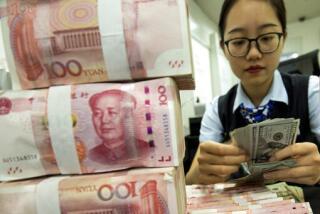Shanghai Slow to Switch Style of Bond Trades
- Share via
SHANGHAI — China has opened the door to bond trading, but in Shanghai, once Asia’s financial capital, most of the business is still waiting to come inside.
Dozens of bond traders cluster in their own makeshift trading “pit” in a dusty street, just a few footsteps from the biggest official exchange.
“Why should I trade in there?” asked a trader, pointing to the front door of the Industrial and Commercial Bank of China, one of this city’s eight officially sanctioned exchanges, which began trading last week.
“If I do, I have to pay them a commission,” he said.
Shanghai is one of seven cities where trading in Treasury bonds has been permitted in a move to attract investors and lure cash from the traditional places of investment, pocketbooks and mattresses.
Resorted to Black Market
China is in dire need of money to finance an expected budget deficit of more than $2 billion (8 billion yuan) this year and pay for an ambitious modernization program for its creaking economy.
It plans to issue $2.5 billion worth of Treasury bonds this year, up from $1.6 billion last year.
In the past, bond trading was illegal. Investors had to hold onto their bonds until they were due or trade them on the black market.
Straddling a ditch, a trader who appears to be in his 30s quotes the latest market price for 1986 bonds, which pay 10% interest for five years.
“I want 112 yuan for the 100 yuan face value bonds,” he said.
“We do more business out here than they do in there,” he adds, motioning toward the bank with a fistful of bills.
He declined to give his name because technically this is still illegal. Only trading inside the official exchanges has been sanctioned by the government.
But this outdoor competition does not seem to worry bank officials.
“This is a first step,” said Hu Ruiquan, deputy manager of the Industrial and Commercial Bank’s Jingan branch, the biggest official market in Shanghai. “It will be a big help to the economy,” he added.
No Big Profit Yet
Hu, 61, said he started out in banking 40 years ago as the Nationalist government was losing its grip on mainland China, one year before the communists forced it to flee to Taiwan.
“We had bond trading in Shanghai then, and the market was much more active,” he said. “Now we are a socialist system and there are ‘special circumstances.’ ”
So far the bank is not making a big profit on bond trading. It takes a 0.3% commission on all trades, and turnover has averaged only about $13,500 a day since it began on April 21.
But that already has surpassed turnover in the five stocks traded at the bank’s office--one of China’s first reforms with Western style financial markets.
Stock trading at the bank averages only a combined $5,400 a day, he said.
Inside the bank, a big electronic board displays the latest quotes for bonds as well as stocks traded. Traders outside can see it, too.
As noon approaches, bank employees pull down office shutters, and ask visitors to leave so they can break for lunch.
But outside in the over-the-doorstep market, trading continues.
More to Read
Sign up for Essential California
The most important California stories and recommendations in your inbox every morning.
You may occasionally receive promotional content from the Los Angeles Times.












